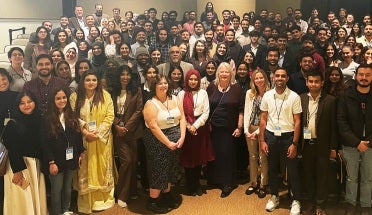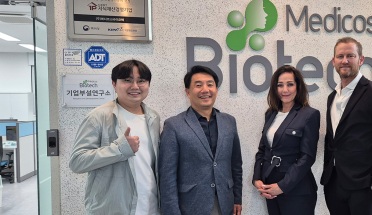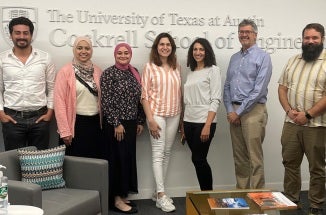
Fulbright Egypt Advisor Balances Academic Rigor and Student Success
- Sep 27, 2022
- Global Customized Programs
- by Alex Briseño
When Dr. Thomas J. Connolly was a mechanical engineering student 35 years ago, he remembers his professor saying on the first day of class: “Look to your left; look to your right: One of you will not graduate.”
Connolly had arrived as a first-generation college student with limited exposure to engineering. He hadn’t participated in accelerated high school activities like some of his peers, nor did he have family members or friends who were engineers.
Hearing that a third of his class would fail didn’t help his feeling of being admitted by accident. But it did fuel his desire to change the message for future generations of engineering students—exactly the work that he’s doing today, as the Engineering Education Institute academic director for the Fulbright Junior Faculty Development Program for Egypt at The University of Texas at Austin.
Dedicated to Engineering, Teaching and International Education
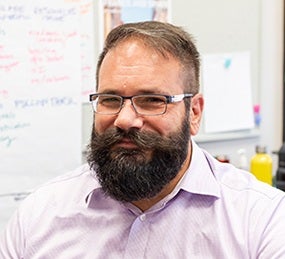
After graduating with a bachelor’s degree in mechanical engineering from the State University of New York at Stony Brook, Connolly worked for five years as an engineer on various projects with the Department of Defense and NASA, which brought him to Texas.
Quitting his job and going to graduate school at UT Austin was one of the best decisions Connolly said he’s ever made. He obtained a master’s in aerospace engineering in 1995 and a doctorate in mechanical engineering in 2000.
Connolly recalls that half of his graduate cohort were international students, many of whom became close friends who helped him become “less Amero-centric” and more aware of different perspectives. At 31, Connolly left the United States for the first time, traveling to the United Kingdom, Israel, Russia and Spain.
“Travel opens up doors for you to learn more about yourself,” Connolly said. “And it builds mutual understanding between people.” Since that first trip, Connolly has taken students on May Term programs to Spain, France and London. He also taught for a summer in Istanbul, Turkey.
Connolly considers himself an ambassador of the U.S. when meeting people from other countries, abroad or at home. He tries to dispel myths or stereotypes that people might have been exposed to via U.S.-dominated media and pop culture.
“I always enjoy dispelling some of those myths. Especially being in Texas—that adds a whole other level,” Connolly joked.
Student Success Initiative for Graduate Teaching Assistants
In 2013, Connolly was hired as an instructional designer in the Cockrell School of Engineering at UT Austin to create and design a teaching assistant training and certification program.
The resulting Student Success Initiative for graduate TAs consists of a one-day training intensive as well as semester-long activities of classroom observation, mentoring, pedagogical discussions, assistance with course evaluations and other components that help TAs contribute to student success.
“Some students are going to assign labels to themselves for ‘not being cut out as an engineer,’ ” Connolly said. “And there are ways we can mitigate that. Something as simple as admitting a particular concept is difficult or acknowledging that students might struggle” can make a big difference, he continued.
In 2016, Connolly started teaching again as a lecturer in both the Department of Aerospace Engineering and Engineering Mechanics and the Walker Department of Mechanical Engineering, a return that has allowed him to better understand the student experience.
“Being in the classroom again has helped me maintain a good connection with students and to see how they’re struggling. Students’ lives have changed a lot with social media and different types of pressures that maybe didn’t exist when I was an undergraduate, so I’m really glad I have that insight into what our undergraduates are experiencing.”
The trick, Connolly says, is not to view academic rigor and student success as mutually exclusive objectives. Effective teaching requires technical expertise in the subject matter as well as other skills for supporting, motivating and engaging students.
Engineering Education Institute Serves Fulbright Egypt Scholars
UT Austin’s 4-week Engineering Education Institute is part of the 10-week Fulbright Junior Faculty Development Program (JFDP) for Egypt, which is administered by AMIDEAST and sponsored by the U.S. State Department Bureau of Educational and Cultural Affairs. UT Austin has served as a host institution since 2019, with the cooperation of campus partners at the Cockrell School of Engineering and the Faculty Innovation Center.
A flagship endeavor of the Global Customized Programs at Texas Global, the program’s goal is to build higher education capacity in the home country of the junior faculty, increase cross-cultural understanding, and foster institutional linkages between Egyptian and U.S. universities.
When Connolly heard about the institute and the Fulbright Egypt JFDP program, he realized that they combined his three main passions: teaching, engineering and international education. He jumped at the opportunity to direct the institute and serve as the academic director for the JFDP program.
“The Engineering Education Institute and Dr. Connolly’s mentorship of the junior faculty is a critical component of the JFDP program,” said Mindy Lee, senior program coordinator for Global Customized Programs, which administers the program at UT Austin. “He has an incredible ability to meet junior faculty where they are in their professional journeys, while inspiring and equipping them to make a lasting impact at their home institutions.”
This year, eight junior faculty from Egypt focusing on renewable energy and engineering participated in the Engineering Education Institute, led by Connolly. The faculty members are early in their careers, some in the process of completion and others having recently received their doctorate degrees. They teach at several universities in Egypt, mostly in the urban centers of Cairo, Alexandria and the Suez Canal area.
Although the Fulbright scholars engage with UT Austin researchers and faculty on their own research projects, the main focus is on classroom methodology, cultural exchange activities and learning the culture of higher education in the U.S. The latter component covers topics such as the tenure system, student admissions processes, and resources for supporting students. Related activities include tours of the university writing center, libraries and innovation centers.
“It’s mirroring what the majority of faculty do here,” Connolly said of the Fulbright Egypt curriculum. “If you’re tenured or tenure-track, you have to do research, teaching and service. It’s reflective of the faculty experience here.”
For their final project, scholars produce a teaching portfolio, complete with a sample lesson plan, quiz, exam and project assignment. The scholars also prepare and execute a mock teaching session, in which they integrate all the principles they learned from the institute.
“My main goal for them was to develop some materials that they could use when they go back to their home institution, based on the principles they studied here,” Connolly said.
The program’s cultural learning and sharing component works naturally in both directions to instill a comfort level between visiting scholars and hosts—and one at which Connolly excels, according to Lee. “The relationships Connolly creates with the scholars are long-lasting,” she said, “as he goes above and beyond to create personal connections and act as a cultural ambassador during their 10-week stay in Austin.”
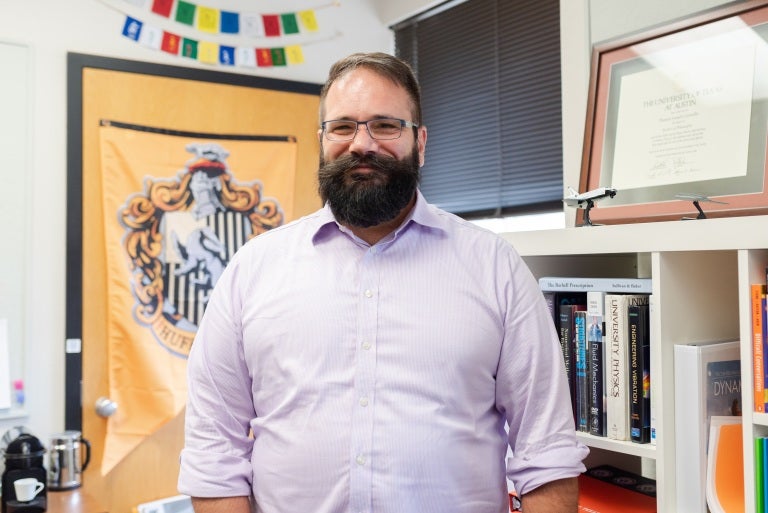
For example, hospitality is an important aspect of Egyptian culture, Connolly said, which became a point of connection between himself and the scholars. Over the summer, he would often bring in pastries for the scholars to enjoy. Once, he asked his wife to pick up Mexican pastries from a famous bakery in San Antonio. “It brought down some walls,” Connolly said. “And it resonated with them culturally.”
In return, the scholars have extended offers to host Connolly in Egypt, he said. “They say to me, ‘You’ve got to come visit. You can stay with us.’ ”
A New Message for Incoming Engineering Students
Although differences exist between the education systems of Egypt and the U.S., Connolly says educators in both countries face the same challenges in the classroom: getting students motivated and engaging them to participate.
Whether they’re TAs or junior faculty, Connolly encourages educators to share aspects of their personal lives as a way to be more approachable and connect with students.
“You don’t have to tell them your whole life story,” Connolly said. But opening up a little can go a long way toward making students feel comfortable, he said, especially when they need to ask for help.
This summer’s Fulbright scholars asked to see a video of Connolly teaching, so he found one from before the pandemic. After viewing the video, one scholar told Connolly, “I think I’m going to smile more when I teach because I noticed you smile a lot, and it’s so welcoming.”
The visiting faculty members also challenged Connolly by contributing counterpoints to maintain the academic rigor of their curriculum. Connolly never advocates for “watering down” course material; instead, he acknowledges the balancing act required to maintain cutting-edge engineering programs alongside methods that support student success.
Ultimately, it’s clear that whether Egyptian, American or another nationality, professors and students alike can benefit from techniques for creating a welcoming academic environment and more supportive messaging.
“The message we’re trying to get across to students now is: We want all of you to be successful,” Connolly said.


